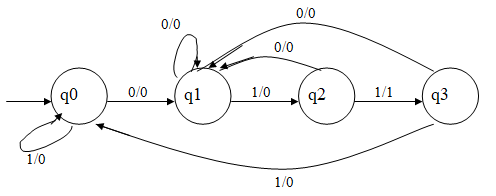In
finite automata, the acceptability of a string depends on whether we reach the
final state or not. If we reach the final state output will be 1, otherwise
output will be 0.
In
a Moore
Moore
Q
is a set of states
Ʃ
is the input alphabet
δ
is the transition table / diagram
q0
is the start state
F
is the set of final states
λ
is the output alphabet
In a Moore
For
example we have to draw a Moore
We
have to give the output as 1 when we detect the string 011
1)
If on q0 we get a 1, stay on q0. If on q0 we get a 0 go to q1, as the sequence
011 is getting formed. Output on q0 is 0
2) If
on q1 we get a 0, stay at q1. If on q1 we get a 1, go to q2 with output on q1
as 0.
3) If
on q2 we get a 0 go back to q1. If on q2 we get a 1, go to q3. Output on q3 is
0.
4)
If on q3 we get a 0 go back to q1 and if we get 1, go back to q0. And output at
q3 will be 1 as the sequence 011 will be detected.
|
|
0
|
1
|
Output
|
|
q0
|
q1
|
q0
|
0
|
|
q1
|
q1
|
q2
|
0
|
|
q2
|
q1
|
q3
|
0
|
|
q3
|
q1
|
q0
|
1
|
Mealy machine
Mealy
machine is also a 6 tuple {Q, Ʃ, δ, q0, F, λ} where,
Q
is a set of states
Ʃ
is the input alphabet
δ
is the transition table / diagram
q0
is the start state
F
is the set of final states
λ
is the output alphabet
In a Mealy machine every transition has a λ
(output) associated with it. If you make a transition that has output 1
associated with it, the input is accepted. This machine is also used in digital
circuits.
For the same example of counting string 011
the Mealy circuit would be as follows
1)
When on q0 if we get a 1, output is 0 and we stay on q0. If we get a 0 on q0, output
is 0 and we go to q1.
2) When
on q1 if we get a 0, output is 0 and we stay at q1. If we get a 1 on q1, output
is 0 and we go to q2.
3)
When on q2 if we get a 0, output is 0 and we go to q1. If we get a 1 on q2,
output is 1 and we go to q3. The string is found here.
4)
When on q3 if we get a 0, output is 0 and we go to q1. If we get a 1 output is
0 and we go to q0.
|
|
0
|
1
|
||
|
|
state output
|
state output
|
||
|
q0
|
q1
|
0
|
q0
|
0
|
|
q1
|
q1
|
0
|
q2
|
0
|
|
q2
|
q1
|
0
|
q3
|
1
|
|
q3
|
q1
|
0
|
q0
|
0
|
Another
example
Draw
a Mealy and Moore
Moore
1)
If on q0 we get a 0, go to q1 with output 1. If on q0 we get a 1, go to q2 and
output will be 0.
2)
If on q1 we get a 0 stay on same state and output will be 1. If on q1 we get a
1, go to q2 and output will be 0.
3)
if on q2 we get a 1, we stay a q2 and output will be 0. If we get a 0 on q2, go
to q1 and output will be 1.
|
|
0
|
1
|
Output
|
|
q0
|
q1
|
q2
|
0
|
|
q1
|
q1
|
q2
|
1
|
|
q2
|
q1
|
q2
|
0
|
Mealy machine
1)
On q0, when we get a 0, stay at q0 and output is 1. if we get 1, stay at q0 and
output is 0
|
|
0
|
1
|
||
|
|
state output
|
state output
|
||
|
q0
|
q0
|
1
|
q0
|
0
|
Another example
Draw a mealy machine for a binary number incrementer
1)
When on q0, if we get a 1, go to q1 and output is 0 as in binary addition 1+1=0
and carry is generated. (q1 is the state for carry)
2)
When on q0 if we get a 1, go to q2 and output is 1 as 1+0=1 and no carry is
generated.( q2 is the state for no carry)
3) At
q1 if we get a 1, stay at the same state and output is 0, again carry is
generated. If we get a 0 at q0, go to qo and output is 1 as no carry is
generated.
4)
When on q2 if we get a 0, stay at the same state and output is 0 and if input
is 1, output is also 1 and stay at the same state.
|
|
0
|
1
|
||
|
|
state output
|
state output
|
||
|
q0
|
q2
|
1
|
q1
|
0
|
|
q1
|
q2
|
1
|
q1
|
0
|
|
q2
|
q2
|
0
|
q2
|
1
|
Feel free to comment below, if you still have some doubts.
Recommended articles:





Comments
Post a Comment